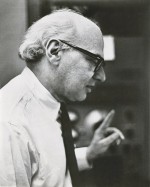Title
Milton Babbitt died on January 29, 2011; this is an excerpt from the eulogy that faculty member Jonathan Dawe gave at his memorial.
Body
Milton Byron Babbitt was his full name. Milton once told me about his name and how he came by it; that he was born and came into this world like most of us—little, wet, and slimy, and that even back in 1916 they had antibacterial ointment that they would immediately anoint to the eyes to ward off infection. His father came into the waiting room as people did back then, and papa Babbitt, taking one look at baby Babbitt, seeing those eyes all glassed- over, exclaimed, “My God, my boy is blind!” and thus at that very moment named him after that English poet whom we know had lived, “half his life in this dark world and wide.” Well, unlike John Milton, Milton did not go blind, although, he did always complain of his eyesight. And when I met him, it was on his mind; he couldn’t see well. But I must say that of anyone I’ve ever met, he had remarkable vision and could see in such clarity, dimension, fidelity.
While I knew Milton first as a student, I don’t really want to talk about him as a teacher, but I will share one story. My second lesson with him, I brought in a newly started composition, just a couple of pages. It was a complex work. I feared it was a bit too ambitious so I kept the tempo moderate at quarter note = 60. He studied the music up and down, looked at the tempo indication, then cocked his head up and said, “I’d push it to 80.” It wasn’t just his way of saying, “look, here at Juilliard these remarkable players can handle it” (I found this out to be true soon enough) but was more his way of saying, “look, trust your inklings, your feeling about composition, don’t hold back,” and for me, hearing this, it was as if I saw that green light that Jay Gatsby sees across the harbor—it didn’t just tell him to go, it told him to go for it. It wasn’t just to do things, it was to do them now. I’ll never forget that moment, and of all the insecurities and of all of the lack of assuredness that I had then as a student composer, well, in that one magical moment Milton made them all melt.
But I really don’t want to talk about Milton as a teacher, nor do I want to talk about his attributes, his personality, his qualities; we know all about them. I would add only one thing—that Milton dealt with complex things in a very simple way and could explain things that were highly dimensional with clarity and in such a cogent way. At the same time, Milton really celebrated things that were simple and understood the richness of them and enjoyed them profoundly. Not long before his time ended here at Juilliard, I went to see him in his office, and I said, “Milton you look hungry.” He shrugged, and I followed, “How about a sandwich?” “Boy, that would be great,” he responded. “How about pastrami?” “On rye, that would be great.” As I left his office to retrieve such a sandwich, I asked, just as the door was shutting, “and how about a little mustard?” His response from behind the door: “How about a lot!” Milton relished his condiments in that way, it was wonderful. We would talk about different types of mustard and many other things.
But the one thing I really want to say about Milton is that of all things, he was a composer. And it is that music, the integrity of it, that representation of high modernism at its best, that acknowledges nothing except the music right on its tail. And yet, even though Milton would claim that his music was “highly contextual,” “self-referential”, “automorphic,” it always bowed its head in an endearing way to the entire canon of Western music. I’m convinced that his music will flourish, and I’m sure that the next generation of remarkable players at Juilliard, the place that was Milton’s special home for so many years, will continue.
So I publically acknowledge Milton Babbitt. For me he was my teacher, my inspiration, my mentor, my friend, my captain, and I will miss him. And so I conclude in the way that Milton would so often finish his anecdotes, by simply saying, “End of story”—but not, I would amend and advance, of his music, his legacy, and his love.





